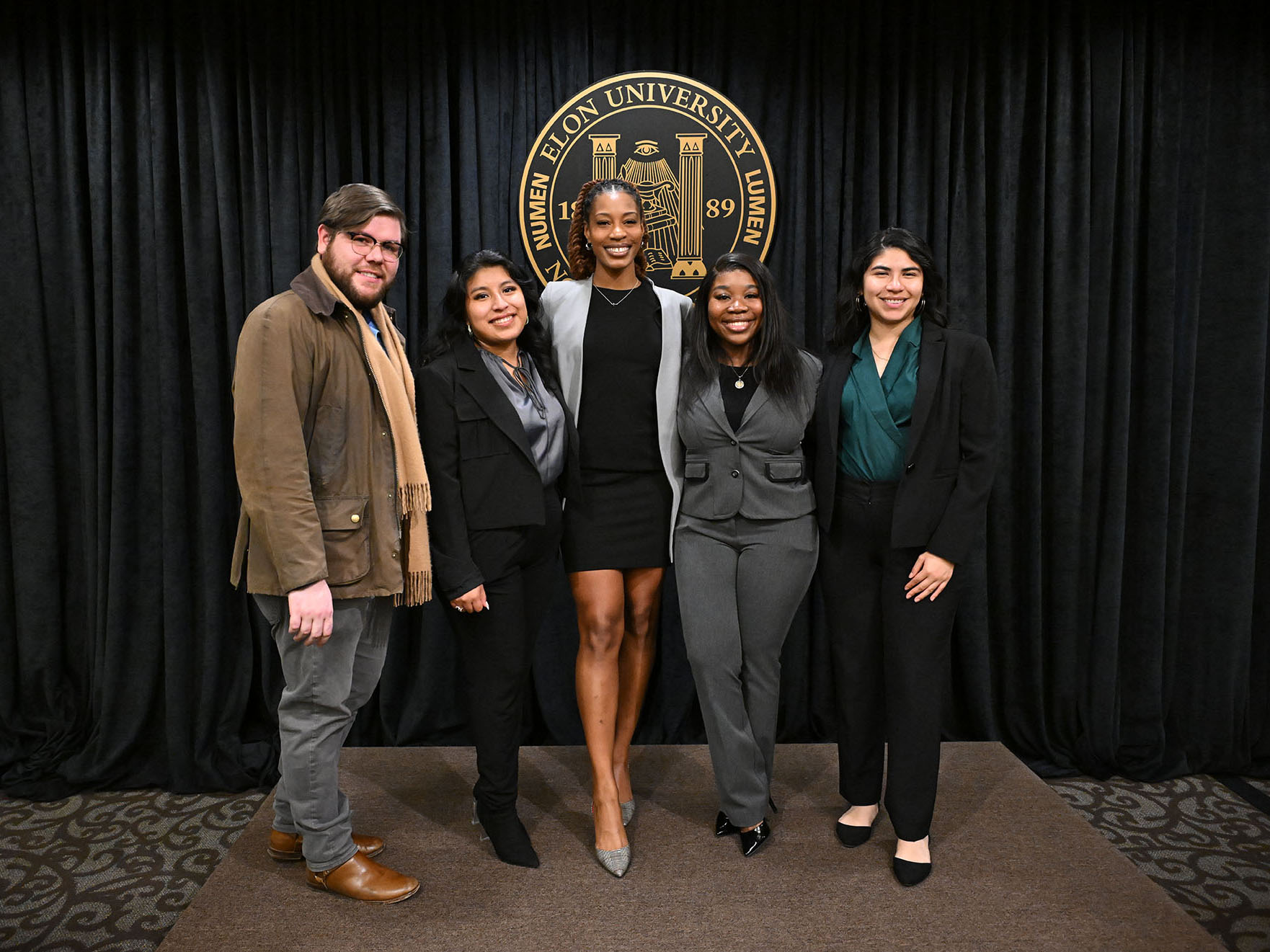Four current students and a recent graduate have worked in recent months to host programs, serve as resources for faculty and staff, and advocate for causes and policies that support a climate of inclusive excellence.
Elon University School of Law welcomed a second cohort of Student Diversity Fellows in 2023-2024 following a successful inaugural year that featured new programs and resources for the law school community.
The four current Student Diversity Fellows – Jennifer Benavides L’24, Brianna Brooks L’24, Lupe (Lizet) Ramirez-Rios L’24, and Lee Wilson L’24 – meet biweekly with leadership of Elon University’ Division of Inclusive Excellence, participate in Student Bar Association meetings, and act as liaisons for classmates.
They were joined through December by Nadia Moore L’23, who graduated with the Class of 2023 and is now a law clerk for Epps Firm LLC in Atlanta after passing the Georgia bar exam.
Fellows have shared techniques for navigating sensitive topics and provided suggestions on teaching strategies in diverse classrooms, planned events that celebrate cultural differences, and are working toward a daylong Orientation program for students from historically excluded communities when they arrive in August with the Class of 2026.
Laké Laosebikan-Buggs, the university’s director of inclusive excellence for graduate and professional education, said that Student Diversity Fellows make significant contributions to a climate of inclusiveness at Elon Law.
“Building on the achievements of their predecessors, this new team is continuing the tremendous work of promoting a university culture that embraces diversity, equity, belonging, and accountability in legal education and in the future practice of law,” she said.
The 2023-2024 Elon Law Student Diversity Fellows
Jennifer Benavides L’24
Hometown: Columbia, Maryland
Alma Mater: B.A. in Religion and Politics & International Affairs, Wake Forest University
Intended Practice Area: Immigration Law
“The legal field is forever changing and developing. As more underrepresented groups attend law school and enter the legal profession, it is important to celebrate their different cultures and life experiences. As a daughter of Mexican immigrants, I am honored and grateful to play a small role in actively celebrating, recognizing, and educating Elon Law’s student body of the various traditions, cultures, and heritages that make up our legal community.”
Brianna Brooks L’24
Hometown: Kinston, North Carolina
Alma Mater: B.A. in Criminology and Political Science, North Carolina State University.
Intended Practice Areas: Business and Military Law
“The law school and legal environment are becoming more diverse every year with diversity, equity, and inclusion programs helping to close gaps that have affected historically marginalized and underrepresented groups. Programs like the Student Diversity Fellows ensure equal opportunities for all aspiring legal professionals regardless of their background or identity.”
Lupe (Lizet) Ramirez-Rios L’24
Hometown: King, North Carolina
Alma Mater: B.A. in History and Anthropology, Wake Forest University
Intended Practice Areas: Civil and Criminal Litigation
“Inclusive excellence programs are necessary for the legal profession because of the growing diversity in both the communities we intend to serve and in the profession itself. Programming can create incremental change within our community at Elon Law that will follow us into our careers by encouraging us to question the biases that may shape our perspectives and help us prevent our unconscious biases from manifesting in harmful or unproductive ways.”
Lee Wilson L’24
Hometown: Greensboro, North Carolina
Alma Mater: B.A. in Political Science and Journalism, University of North Carolina at Chapel Hill
Intended Practice Area: In-House Corporate Counsel
“Before law school, I had the amazing opportunity to serve with Teach for America as a middle school teacher to over 600 students in Greensboro, Atlanta, and Durham. I hope to facilitate learning opportunities for local community members, specifically high schoolers, to learn about their basic civil liberties, and I look forward to having the opportunity to leverage my teaching and curriculum-design background to serve as a resource for professors wishing to incorporate more DEI principles into their classrooms.”



